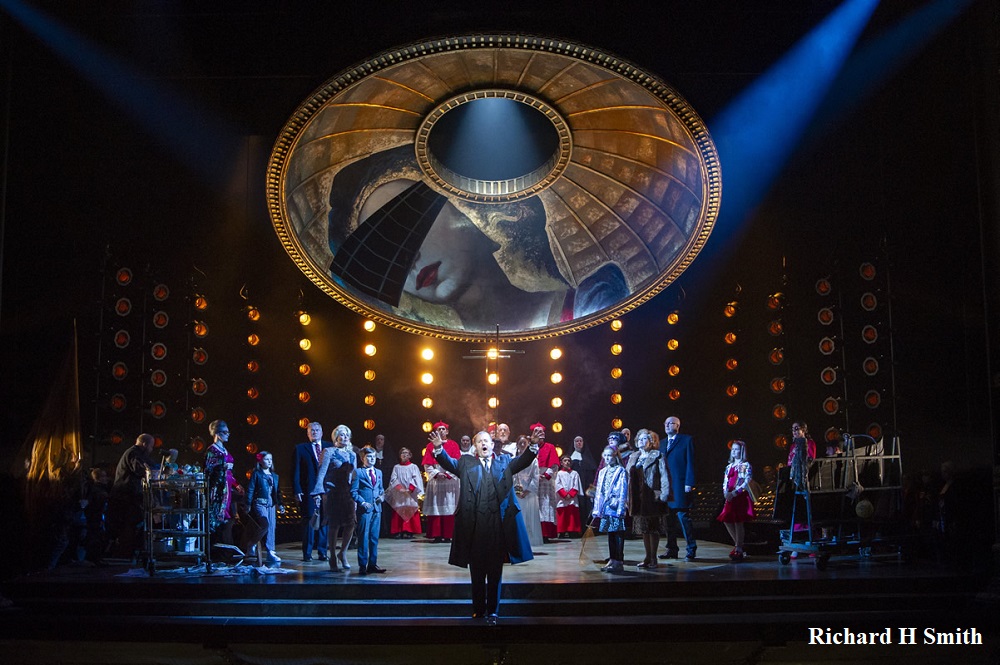As the curtain rose at Hull New Theatre on Thursday night, I reached into my bag for my specs and, if my theatre buddy sister, Chrissy, hadn’t nudged me, I would have missed the most dramatic opening to any performance I have ever seen.
Through the hole in the ceiling of a beautifully painted Italian chapel, dropped a man on a rope. Yes, Tosca had come to town and, boy, were we in for a treat.
The stage setting was simply amazing; atmospheric to the nth degree (take a bow, designer Tom Scutt). The cast wore modern-day clothing and, at one point, a laptop took centre stage. Even though Puccini began composing Tosca in 1898, these nods to the 21st century didn’t seem out of place.
Of course, this being Opera North, the opening drop was accompanied by the most wonderful orchestral accompaniment, along with dramatic lighting, which immensely added to the suspense.
The “dropee” was escaped political prisoner Cesare Angelotti (John Savournin), whose sister, the Marchesa Attavanti, had left a key for him to exit the chapel with, plus a disguise in the form of women’s clothing.
He comes across his friend, church painter Mario Cavaradossi (Rafael Rojas), who kindly gives him the key to his secluded villa.
Meanwhile, Mario’s jealous girlfriend, the Tosca of the opera’s title (Susannah Glanville), senses by his painting of the blue-eyed Mary Magdalene, that he has modelled it on the aforementioned Marchesa, not realising the Marchesa had been at the chapel to help her brother, the escaped prisoner.
Tosca uses all her wiles to seduce Mario there and then (even with the Madonna looking down on them), and insists he repaints over the eyes of Mary Magdalene to give her dark eyes, like her own.
The shenanigans between these two was good fun to watch as Tosca tried to get her own way, while all Mario had on his mind was his desperate friend.
Finally, encouraging her to leave, after promising he would meet up with her at the villa later that night, he decides to take Cesare to the villa himself.
When a cannon fires, signalling a prisoner has escaped, the baddy of the night, Chief of Police, Baron Scarpia (Robert Hayward) enters the fray.
Oooh, I hated everything about this man – which goes to show how convincing Mr Hayward’s portrayal was. The vest didn’t help.
Scarpia and his agents find a fan in the church, belonging to the Marchesa, and when Tosca returns to tell Mario she can’t meet him that night, Scarpia shows her the fan, preying on her jealousy, and convincing her of Mario’s lust for the other woman.
In a rage, she rushes off to the villa, inadvertently leading Scarpia’s men straight to Mario (Cesare had hidden down a well, out of the way).
Of course, the police chief knows Tosca’s weakness, and shows her, on the aforementioned laptop, Mario being tortured. Not able to bear it any longer, she tells Scarpia where Cesare is hidden.
That’s when all hell breaks loose. There’s murder most foul, double-crossing, a suicide (well, two actually), all played out beneath the domes and frescoes of Renaissance Rome. Happy ending it ain’t.
It goes without saying that the singing was absolutely wonderful - I bet you could have heard it on the street outside. Sung in Italian, accompanied by the musical talents of the Opera North Orchestra, conducted by Antony Hermus, there wasn’t a moment the non-Italian speakers among us lost our way, thanks to two easy-to-read screens showing the English translation.
Eighteen youngsters brought a different kind of energy to the stage, and one, Ben Hayes, as the shepherd boy, had the voice of an angel.
The whole package was such a treat that, after the whistles, cheers and lengthy applause had finally abated, my sister (not an opera lover) turned to me and, with a look of wide-eyed amazement, said: “That’s the best thing I have ever seen”.
It had to be something special to keep the audience enthralled for 2 hours 40 minutes. Bravo, Opera North!
Reviewer: Jackie Foottit
Reviewed: 1st November 2018
North West End Rating: ★★★★★

